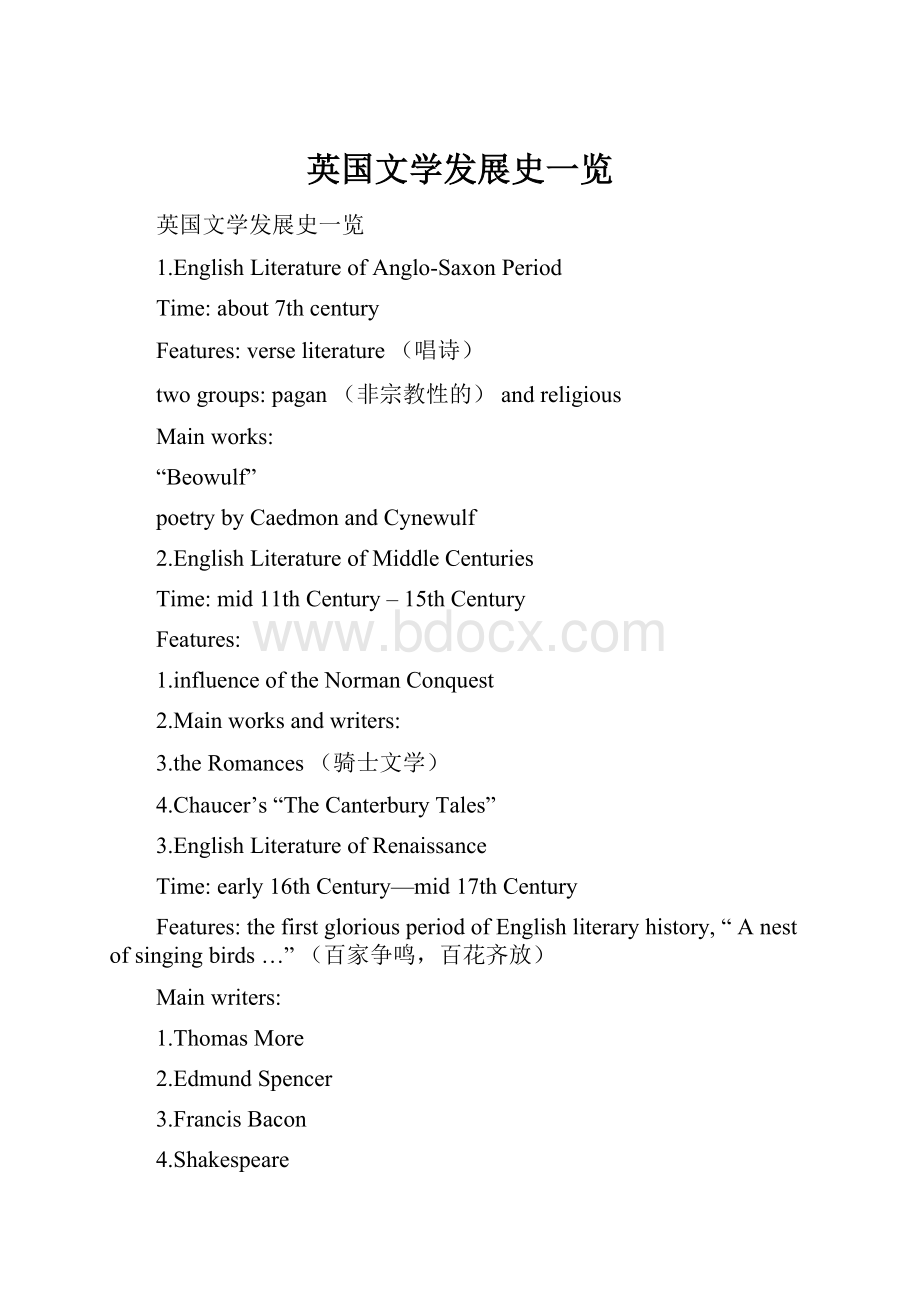英国文学发展史一览.docx
《英国文学发展史一览.docx》由会员分享,可在线阅读,更多相关《英国文学发展史一览.docx(74页珍藏版)》请在冰豆网上搜索。

英国文学发展史一览
英国文学发展史一览
1.EnglishLiteratureofAnglo-SaxonPeriod
Time:
about7thcentury
Features:
verseliterature(唱诗)
twogroups:
pagan(非宗教性的)andreligious
Mainworks:
“Beowulf”
poetrybyCaedmonandCynewulf
2.EnglishLiteratureofMiddleCenturies
Time:
mid11thCentury–15thCentury
Features:
1.influenceoftheNormanConquest
2.Mainworksandwriters:
3.theRomances(骑士文学)
4.Chaucer’s“TheCanterburyTales”
3.EnglishLiteratureofRenaissance
Time:
early16thCentury—mid17thCentury
Features:
thefirstgloriousperiodofEnglishliteraryhistory,“Anestofsingingbirds…”(百家争鸣,百花齐放)
Mainwriters:
1.ThomasMore
2.EdmundSpencer
3.FrancisBacon
4.Shakespeare
4.EnglishLiteratureduringtheBourgeoisRevolution
Time:
1625—1688
TheEnglishBourgeoisRevolutionbeginsfrom1642
Features:
PuritanagerepresentedbyJohnMilton
Mainliteraryform:
Poetry
Mainwriters:
JohnMilton1608--1674
5.EnglishLiteratureofthe18thCentury
Features:
AlsoastheEnlightenmentMovementPeriod(启蒙时期)
Itisdividedinto3stages:
1.“Gloriousrevolution”totheendof1730’s;
2.Thematureperiod(1740’s—1750’s);
3.Thelastperiodcoverstherestdecadesofthe18thcentury.
Mainauthors:
(小说家)DanielDefoe,JonathanSwift,HenryFielding
(诗人)AlexanderPope
6.RomanticisminEngland
Time:
1798--1832
Features:
1.是英国文学史上诗歌最为繁盛的时期;
2.分为消极和积极两组。
Mainpoets:
1.以WilliamWordsworth为代表的消极派“湖畔派诗人”
2.以Shelley,Baron,Keats为代表的积极派诗人。
7.EnglishLiteratureoftheMid&Late19thCentury
Features:
又被称为“CriticalRealismPeriod”即批判现实主义阶段;
以CharlesDickens和WilliamThackeray为代表的现实主义小说家;
作品集中反映19世纪英国的社会现实;
开始涌现一批女作家:
有大家熟悉的CharlotteBronte&EmilyBronte,她们的代表作有《呼啸山庄》和《简爱》
8.EnglishLiteratureofthe20thCentury
Features:
二十世纪以来,英国在世界上的主导地位日渐趋淡,二战以后更是附属于美国;
国内女权运动高涨;
文学作品多反映中下层人民的生活,涉及诸多生活侧面;
抒情诗再领潮流。
Mainwriters:
1.BernardShaw的戏剧;
2.D.H.Lawrence的情爱小说;
3.JamesJoyce的意识流小说,“StreamofConsciousness”
4.WilliamButlerYeats的诗歌。
AppreciationofpoetryfromtheaspectofVersification
Contents
Ⅰ.Meter
Ⅱ.Foot
Ⅲ.Rhythm
Ⅳ.Soundpatterns
Ⅴ.Rhyme
Ⅵ.RhymeScheme
Ⅶ.Formsofpoem
Ⅷ.Appreciations
Ⅰ.meter(格)
1.concept:
theregularpatternofstressedandunstressedsyllables.
2.types:
“︶”standsforunstressedsyllableand“_”representsstressedsyllable.“\”isusedtoseparatedifferentfeet.
1.抑扬格(轻重格)Iambus:
是最常见的一种格式,每个音步由一个非重读音节加一个重读音节构成。
Asfair/artthou/mybon/nielass,
Sodeep/inluve/amI:
AndI/willluve/theestill,/mydear,
Tilla`/theseas/gangdry:
RobertBurns(1759-1796):
MyLuveIslikeaRed,RedRose
注:
art=are luve=love bonnie=beautiful a`=all gang=go
上例中为四音步与三音步交叉,可标示为:
︶-/︶-/︶-/(︶-)
2.扬抑格(重轻格)Trochee:
每个音步由一个重读音节加一个非重读音节构成。
Tyger!
/Tyger!
/burning/bright
Inthe/forests/ofthe/night
WilliamBlake:
TheTyger
上例中为四音步扬抑格(少一个轻音节),可标示为:
-︶/-︶/-︶/-
3.抑抑扬格(轻轻重格)Anapaestfoot:
每个音步由两个非重读音节加一个重读音节构成。
Likeachild/fromthewomb,
Likeaghost/fromthetomb,
Iarise/andunbuild/itagain.
三音步抑抑扬格︶︶-/︶︶-/︶︶-
4.扬抑抑格(重轻轻格)Dactylicfoot:
每个音步由一个重读音节加两个非重读音节构成。
ˊTouchhernot/ˊscornfully,
ˊThinkofher/ˊmournfully.
--ThomasHood
两音步扬抑抑格-︶︶/-︶︶
5.抑扬抑格(轻重轻格)Amphibrach:
每个音步由一个非重读音节加一个重读音节再加一个非重读音节构成。
如:
三音步抑扬抑格︶-︶/︶-︶/︶-︶
下例中最后一个音步为抑扬格。
Oˊhushthee/myˊbabie/thyˊsirewas/aknight.
注:
在同一首诗中常会出现不同的格律,格律解析对朗读诗歌有一定参考价值。
现代诗中常不遵守规范的格律。
Ⅱ.Foot(音步)
1.Concept:
aunitofpoeticmeterofstressedandunstressedsyllable
2.Types:
•Monometer:
onefoot;Pentameter:
fivefeet
•Dimeter:
twofeet;Hexameter:
sixfeet
•Trimeter:
threefeet;Heptameter:
sevenfeet
•Tetrameter:
fourfeet;Octameter:
eightfeet
Distinctionbetween“foot”and“meter”
Footisnottobeconfusedwithmeter,thoughthenamesforfeetendwith
“-meter”.Meterisbasedonsyllables,indicatinghowstressedandunstressedsyllablesarearranged.Footisappliedwithasingleline,indicatinghowmanymetersareemployedinthatline.
Note:
Meter+foot=metricalrhythm/versification
Ⅲ.Rhythm(节奏/韵律)
concept:
Thepassageofregularorapproximatelyequivalenttimeintervalsbetweendefiniteeventsortherecurrenceofspecificsoundsorkindsofsoundsortherecurrenceofstressedandunstressedsyllablesiscalledrhythm.
Twinkle,twinkle,littlestar,
HowIwonderwhatyouare!
Ⅴ.rhyme(押韵)
1.concept:
therepetitionofthestressedvowelsoundandallsucceedingsounds
e.g.Home,Foam;chair,there
2.types:
Ⅵ.RhymeScheme(韵式)
1.Concept:
Thearrangementofrhymesinapoemorstanza.
2.types:
1.endrhyme(尾韵)occursattheendofaline.
1)联韵:
“aabb”型。
Ishotanarrowintotheair,a
Itfelltoearth,Iknewnotwherea
For,softlyitflew,thesightb
Couldnotfollowitinitsflight.b
HenryWadsworthLongfellow:
TheArrowandtheSong
2)交叉韵:
abab型。
Sunsetandeveningstar,a
Andoneclearcallforme!
b
Andmaytherebenomoaningofthebar,a
WhenIputouttosea,b
AlfredTennyson(1809-1892):
CrossingtheBar
3)同韵:
有的诗押韵,一韵到底,大多是在同一节诗中共用一个韵脚。
如下例就共用/i:
p/为韵脚
Thewoodsarelovely,darkanddeep,
ButIhavepromisestokeep,
AndmilestogobeforeIsleep,
AndmilestogobeforeIsleep.
RobertFrost(1874-1963):
StoppingbyWoodsonaSnowyEvening
2.头韵(alliteration):
是指一行(节)诗中几个词开头的辅音相同,形成押韵。
下例中运用/f/、/b/与/s/头韵生动写出了船在海上轻快航行的景象。
Thefairbreezeblew,thewhitefoamflew,
Thefurrowfollowedfree,
Wewerethefirstthateverburst
Intothatsilentsea.
T.S.Coleridge:
RimeoftheAncientMariner
3.内韵:
指词与词之间原因的重复形成的内部押韵。
下面一节诗中/i/及/iη/重复照应,呈现出一派欢乐祥和的气氛。
Spring,thesweetspring,istheyear’spleasantking;
Thenbloomseachthing,thenmaidsdanceinaring,
Colddathnotsting,theprettybirdsdosing:
Cuckoo,jug-jug,pu-we,to-witta-woo!
ThomasNashe(1567-1601):
Spring,theSweetSpring
Ⅶ.Formsofpoem(诗体)
Formisthedesignofapoem,theparticularpatternittakeswhenitiswrittenonpaper.Ineachpoem,weusuallyfindanumberofsimilarunits.Eachunitmayhavethreelines,fourlinesormore.Thisrecurringunitofa
poemiscalledstanza.(诗节)
2.FormsofPoetry
1).Blankverse(无韵诗体)
Blankverse:
unrhymediambicpentameter,alineconsistingoffivefeetofunstressedandstressedsyllables.(由不押韵的诗行组成的诗体,通常是抑扬格五音步)
Examples:
Shakespeare'splays,Milton'sParadiseLostandWordsworth'sPreludearewritteninblankverse.ThefollowingisfromShakespeare'sAsYouLikeIt:
Alltheworld'sastage,
Andallthemenandwomenmerelyplayers:
Theyhavetheirexitsandtheirentrances.
2).Couplet(对偶句)
Couplet:
apairofrhymedlineswhichmayormaynotconstituteaseparatestanzainapoem.Popularintheeighteenthcentury,acoupletmaybelongorshort,butusuallycontainacompletethoughtinitself,thefirstlineendingwithapauseandthesecondlinewithafullstop.(包括两个相连的诗行的一种诗的单位,通常压韵并具有同样的格律,经常组成一个完整的意思和句法单位。
)
Examples:
GeoffreyChaucerandJohnDrydenamongothershavewrittenincouplets.ThefollowingisfromDryden's"MacFlecknoe".
Allhumanthingsaresubjecttodecay
Andwhenfatesummons,monarchsmustobey.
3).Tercet(同韵三行诗节)
Tercet:
athree-linestanza,alsocalledterzarima,which,ifrhymed,keepstoonerhymesound.(由三行诗文组成的一个诗节,通常压同韵或与另一三行诗节压韵)
Example:
Dante'sDivineComedyandShelley's"Odeto
theWestWind"usedthisstanza.ThefollowingisfromShelley.
OwildWestWind,thoubreathofAutumn'sbeing,
Thou,fromwhoseunseenpresencetheleavesdead
Aredriven,likeghostsfromanenchanterfleeing,
4).Quatrain(四行诗)
Quatrain:
afour-linestanzainmanylinelengthsandsometimesinlinesofvaryinglength,rhymedusuallyinlinestwoandfour.
(四行一节的诗)
Example:
ThisstanzaisusedveryofteninEnglishpoetry,mostnotablyinballads,andinThomasGray's"ElegyWritteninaCountryChurchyard"andTennyson's
InMemoriam.HereisanexamplefromTennyson's"Break,Break,Break".
Break,break,break,
Onthycoldgraystones,OSea!
AndIwouldthatmytonguecouldutter
Thethoughtsthatariseinme.
5).Sonnet(十四行诗)
Sonnet:
afourteen-linestanzaofiambicpentameter.ComingoriginallyfromItalyandusedoftentowritelovepoems,theEnglishsonnethasdifferentrhymeschemes.TheItaliansonnet,orPetrarchansonnet((意大利诗人彼特拉克推广的)彼特拉克体十四行诗),consistsofanoctave(8-linestanza)andsestet(6-linestanza),rhymedabbaabbacdecde.TheEnglishsonnet,initiatedbyEdmundSpensercalledSpenserianStanza,rhymedabab-bcbc-cdcd-eeShakespeareansonnet,consistsofthreequatrainsandacouplet,rhymedababcdcdefefgg.MostEnglishpoetshavewrittensonnetsandsomehavewrittenaseriesofsonnetsoncertainsubjects.ThemostfamoussonnetsequencesareSpenser'sAmoretti,Shakespeare'sSonnetsandElizabethBarrettBrowning'sSonnetsfromthePortuguese.
6).Epigram(讽刺短诗;警句;隽语诗,)
Epigram:
ashortpoemendinginawittyturnofthought.Briefandrhymed,epigramisusuallysatiric,mercilesslyplayfulandsometimesmalicious.
Example:
ThefollowingisfromJ.V.Cunningham(1911-1985):
ThisHumanistwhomnobeliefsconstrained
Grewsobroad-mindedhewasscatter-brained
7).Limerick:
(五行打油诗)
Limerick:
fiveanapesticlinesusuallyrhymedaabba.MadepopularbyEdwardLear(1812-1888),authorofnonsensepoems,limerickishumorousandplayful.(一种通俗幽默短诗,有五行组成,韵式为aabba)
Example:
ThefollowingisfromananonymousauthorandaboutEinstein'stheoryofrelativity.
TherewasayoungladynamedBright
Whotraveledmuchfasterthanlight.
Shestartedoneday
Intherelativeway
Andreturnedonthepreviousnight.
Ⅷ.Appreciatethefollowingsonnet
ThatTimeofYear
ByShakespeare
Thattimeofyearthoumay’stinmebehold
Whenyellowleaves,ornone,orfew,dohang
Uponthoseboughswhichshakeagainstthecold,
Bareruinedchoirswherelatethesweetbirds